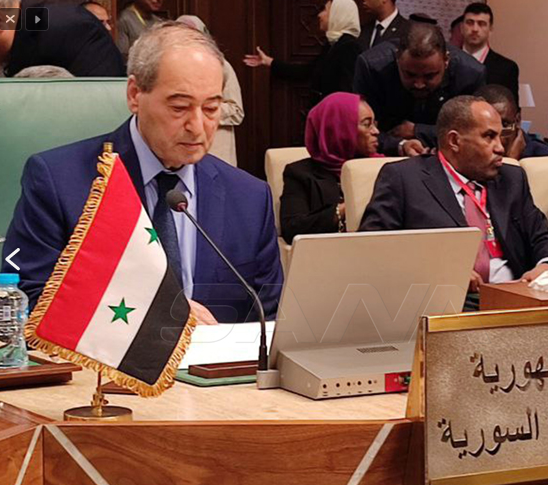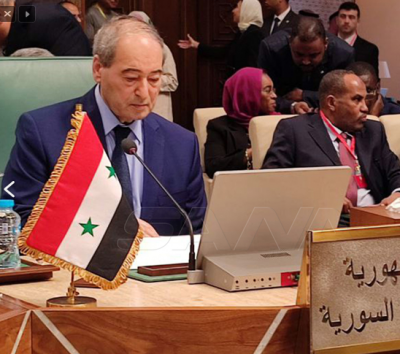Syrian Foreign Minister and Expatriates Faisal Mikdad affirmed that Arab national security is interconnected and indivisible. The challenges faced by many Arab countries, including interventions in their internal affairs, military aggressions, foreign occupations of parts of their territories, and the spread of terrorism and poverty, as well as the decline of developmental indicators, threaten Arab security as a whole. This situation requires strengthening joint Arab action and concerted efforts to put an end to these threats.
Mikdad, in a speech representing Syria at the 160th session of the Arab League Council at the ministerial level in Cairo today, stated: "We meet at a time when the world continues to face intertwined challenges and crises threatening its countries," a situation exacerbated by a trend of unilateralism in managing international relations that violates the sovereignty of countries, intervenes in their internal affairs, targets their national institutions, and threatens their unity and territorial integrity, all serving interventionist agendas promoted by some Western countries, violating international law and the principles and purposes of the United Nations Charter.
Mikdad explained that the decisions made at the Jeddah Summit, together with previous Arab-Arab and Arab-regional reconciliations, and Syria's continued role in its natural regional context, mark a significant turning point and the inauguration of a new phase of joint Arab action and regional rapprochement aimed at solidarity among us for the benefit of the region's countries and their peoples. He emphasized that we must all adhere to what was achieved in the Jeddah Summit, as Arab national security is interconnected and indivisible, requiring genuine cooperation among Arab states and their joint institutions, based on the requests of concerned countries, to resolve the crises affecting Libya, Yemen, and Sudan without external interventions, and to confront Turkish military interventions in Syria and other Arab countries that threaten Arab national security and higher Arab interests.
He noted that Syria cooperates with the Arab Contact Committee on the basis of full commitment to its sovereignty, independence, unity, and territorial integrity, and non-interference in its internal affairs, driven by its belief in the importance of the brotherly Arab role in supporting the Syrian people to overcome the repercussions of the terrorist war against them and to conquer the fundamental challenges they face, foremost among which is combating terrorism in all its forms and manifestations, ending any illegitimate foreign military presence on Syrian territory, which constitutes an occupation violating international law and the UN Charter, lifting unilateral coercive measures imposed on the Syrian people, and providing the requirements for the return of displaced Syrians both internally and externally to their homes and country.
The Foreign Minister clarified that the first meeting of the Committee held in Cairo mid-last month provided an opportunity to present the measures and facilities that Syria has taken recently to deliver humanitarian aid to all its citizens without discrimination, to facilitate the return of willing Syrians to their country, and to review the difficulties hindering their return due to terrorism and the Western economic blockade. He stressed in this regard the importance of international support to expand the scope of humanitarian activities in Syria, including early recovery projects and their funding away from political conditionality, aiming to improve humanitarian conditions and prepare the necessary ground for the prioritized return of refugees.




